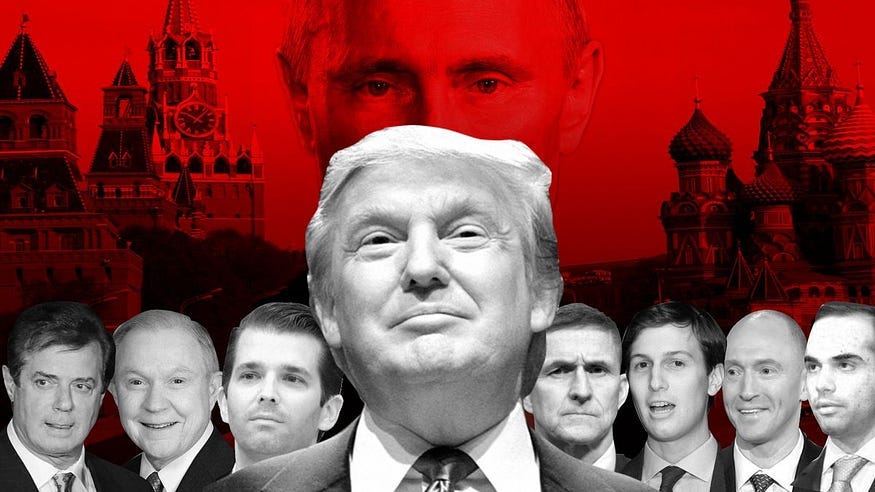Analysis of Team Trump’s Russian Ties
Unraveling Connections and Implications
This article outlines various connections between key members of Donald Trump’s team and Russian interests, stretching back several decades. These connections range from business deals and political consultations to more direct interactions with Russian officials and oligarchs. Here’s a detailed breakdown of some of the key players and their ties to Russia:
Key Figures and Their Ties to Russian Interests
Donald Trump:
Business Ties: Trump’s connections with Russia date back to the 1980s when he began exploring real estate opportunities in Moscow. Over the years, he cultivated relationships with Russian businessmen, such as Aras Agalarov, who hosted the 2013 Miss Universe pageant in Moscow.
Political Interactions: During the 2016 campaign, Trump frequently made positive comments about Vladimir Putin, suggesting that they would have a good relationship. He denied any business dealings with Russia during the campaign, despite efforts to develop a Trump Tower in Moscow.
Controversies: His statements on Russia often contradicted those of the U.S. intelligence community, which concluded that Russia interfered in the 2016 election. His dismissive stance on Russian interference allegations has been a significant source of controversy.
Paul Manafort:
Business Ties: Manafort, Trump’s former campaign chairman, had deep business connections with pro-Russian interests in Ukraine and was paid millions by Russian oligarch Oleg Deripaska.
Political Influence: During his tenure with Trump’s campaign, Manafort reportedly offered private briefings to Deripaska and advocated for a pro-Russian stance in the Republican Party platform.
Legal Issues: Manafort has been charged with conspiracy against the United States, money laundering, and other crimes related to his work in Ukraine.
Michael Flynn:
Diplomatic Contacts: Flynn, Trump’s former National Security Adviser, had several undisclosed meetings with Russian Ambassador Sergey Kislyak. He also attended a dinner in Moscow, where he sat next to Putin, and was paid by the Russian state-sponsored media outlet RT.
Legal Consequences: Flynn resigned shortly after taking office due to misleading statements about his contacts with Kislyak. He later pleaded guilty to lying to the FBI about these contacts.
Jared Kushner:
Meetings with Russians: Kushner, Trump’s son-in-law and senior adviser, met with Sergey Kislyak and Sergey Gorkov, a Russian banker close to Putin. He also attended the June 2016 Trump Tower meeting with a Russian lawyer promising damaging information on Hillary Clinton.
Business Ties: Kushner’s real estate company has received investments from Russian tech billionaire Yuri Milner.
Donald Trump Jr.:
Trump Tower Meeting: Trump Jr. played a key role in arranging the June 2016 meeting with Russian lawyer Natalia Veselnitskaya. Emails show he was informed the meeting was to discuss information from the Russian government that could harm Clinton’s campaign.
Other Notable Figures:
Carter Page: A former foreign policy adviser for the Trump campaign, Page had several meetings with Russian officials and was under FBI surveillance.
Roger Stone: A longtime Trump ally and adviser, Stone communicated with WikiLeaks and Guccifer 2.0, a persona linked to Russian hackers, during the 2016 election.
Michael Cohen: Trump’s personal lawyer, Cohen was involved in efforts to develop a Trump Tower in Moscow during the 2016 campaign and delivered a Russian-backed peace plan for Ukraine to the White House.
Patterns of Engagement and Implications
The reported interactions between Trump’s associates and Russian officials suggest a pattern of consistent engagement with Russian interests, both business and political. These connections have raised significant concerns about potential conflicts of interest, undue influence, and possible coordination with a foreign adversary.
Business Opportunism: Many of these interactions appear to have been motivated by personal or business interests. Trump, his family, and associates have pursued various business deals in Russia or with Russian nationals, which could raise questions about conflicts of interest.
Political Strategy: The meetings and communications with Russian officials and intermediaries during the campaign suggest attempts to gain political advantage. For instance, the Trump Tower meeting and subsequent handling of its disclosure indicate potential awareness of Russian offers to assist Trump’s campaign.
Legal and Ethical Concerns: Several of Trump’s aides, including Manafort, Flynn, and Cohen, have faced legal consequences for their actions related to their ties with Russian interests. This has led to investigations into whether these actions violated U.S. laws or compromised national security.
Consequences of Inaction and Complicity
The Republican Party leadership, including figures like Paul Ryan and Kevin McCarthy, had early knowledge of possible ties between Trump and Russia but chose not to pursue further action, ostensibly to avoid political fallout. This decision has far-reaching consequences:
Political Complicity: By failing to address these concerns more vigorously, Republican leaders may have inadvertently enabled continued foreign interference and potential breaches of national security.
Undermining Public Trust: The lack of transparency and accountability around these ties has fueled public mistrust in government institutions and officials, contributing to a more polarized political environment.
Long-term Damage to Democratic Institutions: The normalization of foreign interference and misinformation has weakened democratic norms, potentially inviting further attempts to manipulate U.S. elections in the future.
Conclusion
The extensive connections between Trump’s team and Russian interests underscore the complex interplay of business, politics, and international relations that characterized the 2016 election. While some ties may have been opportunistic or coincidental, others suggest more deliberate efforts to engage with foreign actors for political gain. The failure to address these issues transparently and thoroughly has created lingering concerns about accountability, the integrity of U.S. elections, and the resilience of American democracy in the age of the information war.



